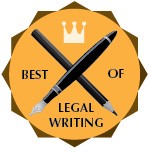 In law school, we’re taught to zealously advocate for clients. But in brief writing, attorneys shouldn’t resort to hyperbole, sarcasm and exaggeration to achieve that goal.
In law school, we’re taught to zealously advocate for clients. But in brief writing, attorneys shouldn’t resort to hyperbole, sarcasm and exaggeration to achieve that goal.
When seeking to persuade, it’s critical to stay within the bounds of the facts and law – otherwise you will lose credibility with your reader, who, in the case of legal briefs, also happens to be the decider.
In the facts section, be accurate and complete. You can be persuasive in word choice and how you frame the events, but don’t overstate. For example, don’t substitute “many” for “three.”
Similarly, your characterization of facts should not be judgmental or argumentative. Pay particular attention to modifiers, adjectives and adverbs – using words like clearly, obviously and very indicate weakness rather than strength. After all, if something was so clear or obvious, why is your client embroiled in a lawsuit? Also, don’t exaggerate with inflammatory pronouncements like “the plaintiff flagrantly misrepresented the facts.”
Trying to hide damaging facts or legal precedent under hyperbole is actually akin to advertising them with a neon sign. Likewise, unsuitable analogies or comparisons can hurt rather than enhance your position.
Generalities and conclusory or overblown statements are tools of the lazy. Instead, make well-reasoned and nuanced arguments, which will gain you far more respect from the court. Address, rather than hide, your weak points and candidly explain how they shouldn’t change the outcome. Toss mediocre arguments al-together – don’t dilute your brief with a jumble of imprecise legal theories.
With solid analysis and straightforward writing, guide judges through briefs so they feel as if they’re coming to their own conclusions, rather than being bullied into it by overstatement.
Be a fair and reasonable advocate – not an exaggerating zealot – because once you blow it, it’s nearly impossible to regain a court’s trust.
From the Editor:
A huge thank you to Leslie A. Gordon, author of our long-running “Legal Writing Tips” column who retired from the column with the August 2014 issue of the BASF Bulletin. Her monthly columns started in 2008 and featured sage advice for improving writing and avoiding grammar errors. The BASF Bulletin will begin featuring “The Best of Legal Writing Tips” until a replacement contributor can be finalized.
About the author:
 A former lawyer, Leslie A. Gordon is a freelance journalist living in San Francisco. She is the author of Cheer: A Novel, which is available on Amazon. She can be reached via email at leslie.gordon@stanfordalumni.org. Follow Leslie on Twitter: @LAGordonWriter.
A former lawyer, Leslie A. Gordon is a freelance journalist living in San Francisco. She is the author of Cheer: A Novel, which is available on Amazon. She can be reached via email at leslie.gordon@stanfordalumni.org. Follow Leslie on Twitter: @LAGordonWriter.



0 comments on “Legal Writing Tip: Avoid Losing Credibility When Writing Your Brief”